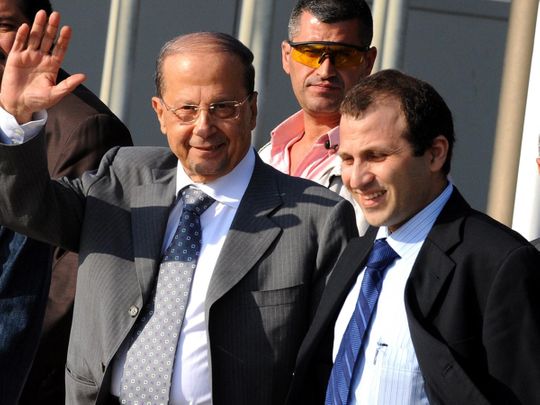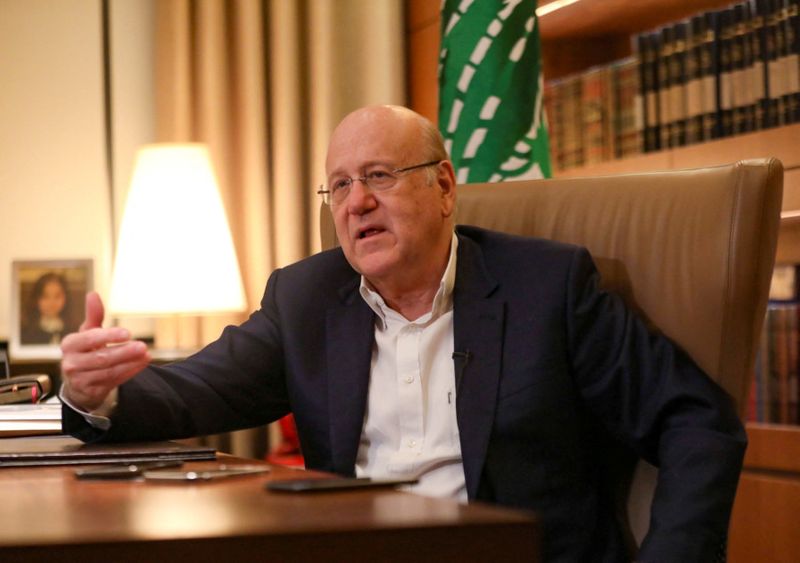Move to make son-in-law the new president is entangled in the maritime talks with Israel

Constitutional jurisprudence is in full gear in Beirut, as Lebanese legal experts are asked whether their octogenarian president, Michel Aoun, can stay in office beyond the expiration of his six-year term, which ends on October 31, 2022. His supporters insist that he can, based on an article in the Lebanese Constitution, which prevents the inauguration of a new president unless sworn-in before a full-fledge cabinet of ministers, one that has received a vote of confidence from parliament. Prime Minister Najib Mikati, tasked with creating his fourth cabinet last June, is yet to form one.
If no government is ready, then there won’t be a presidential election in October, meaning an automatic extension of Aoun’s term. That means that Aoun would get to stay at Baabda Palace for an indefinite period, they say.
This claim is facing a strong counter-argument, led by Parliament Speaker Nabih Berri, who was never happy with the Aoun era and wants to make sure that it ends on October 31. His initiative says that if no full-fledged cabinet is in place between now and then, then Prime Minister-designate Mikati would temporarily assume presidential powers, meaning a definite end to Aoun’s term and the temporary transfer of presidential powers from a Maronite Christian to a Lebanese Muslim.
Aoun needs to abort the [maritime] decree that has been sitting on his office desk for more than a year, waiting to be signed. Aoun will only change his position if he is given assurances for Bassil by the Americans.
Aoun has given the Lebanese public contradicting statements, insisting that he has no intention of staying in power beyond his presidential term but also saying that he won’t leave the country in a political vacuum. Those close to the ageing president confirm that he really doesn’t want to stay in power but is simply using the extension of his term as a pressure card to secure the presidency for his son-in-law and political heir Gibran Bassil, leader of the Free Patriotic Movement (FPM).
That is his real goal, and ultimate objective.
Bassil, however, lacks the 65-vote majority in parliament needed to secure his nomination. Losing faith in any domestic breakthrough, Aoun is now turning to the United States, hoping to secure support of the Joe Biden Administration for Bassil’s presidential bid. That is easier said than done, due to US sanctions imposed on Bassil under former President Donald Trump back in November 2019.
The president seems to believe that he can now put that on the negotiating table, along with the political future of his son-in-law. He is using Lebanon’s maritime talks with Israel as a pretext, commenced under UN auspices, with US mediation, back in October 2020.
Aoun’s impossible conditions
Those talks were initiated based on official claims of disputed territorial waters, registered formally at the UN. Lebanon had fixed its disputed waters at 860 sq km, only to suddenly change that claim to 2,300 sq km — nearly tripling the area — at the orders of Aoun. Lebanon’s negotiating team questioned the sudden change, saying that it had no legal pretext. So did Speaker Berri, who had handled talks with the US since 2011.
Aoun had personally pushed for this amendment, in coordination with his allies in Hezbollah, forcing the cabinet of then-prime minister Hasan Diab to put it into law, which ought to have been sent to the UN as Lebanon’s new terms of reference for any future round of talks with Israel. The decree was signed by Diab and his defence minister Zena Akar and then sent to Aoun for ratification into a presidential decree.
It has been on his table ever since. He has neither signed the decree, and nor has he aborted it. Aoun is using this as his last card, waiting for the Americans to come knocking on his door, seeking his formal abandonment of the new disputed territory, in exchange for lifting sanctions on Bassil and supporting his bid for president.
The Hezbollah factor
The US envoy Amos Hochstein was in Beirut in early August, where he said that Lebanese authorities had promised him to drop demands for controlling parts of the Karish gas field, (which is an Israeli reservoir), in exchange for full control of the Qana gas field in Lebanon’s Exclusive Economic Zone (EEZ). This is the position of the Mikati cabinet, but not of Hezbollah or of Iran. With no Hezbollah support, it will not pass in any future round of negotiations, regardless of what the president does or says.
Hezbollah hopes to drown the talks altogether, insisting on the expanded territorial waters that it knows Israel would never accept. It knows that Karish is an Israeli field that no Israeli leader can abandon.
Aoun, however, is promising the US that he can talk Hezbollah into a compromise. But in return, expects a hefty reward from the Americans. To date, Hezbollah’s demands have been clear: no gas field swap with Israel, no shared fields, and no direct talks, while specifically insisting on 2,300 sq km of disputed waters, rather than 860 sq km.

It is highly doubtful that Aoun has enough leverage to convince Hezbollah into abandoning its conditions. The two sides reached a tactic alliance in February 2006, where in exchange for Aoun’s support for Hezbollah arms, they would support making him president. Both have lived up to their sides of the agreement, and now, with Aoun’s term coming to an end, the Iran-backed party feels that it is under no obligation to accommodate Aoun any further.
It is an open secret that the party does not support Bassil for president, preferring instead their long-time ally Suleiman Frangieh of the Marada Movement.
When the maritime talks began in 2020, Aoun tried to impose himself on the negotiations, but came against a brick wall from Hezbollah. He called expanding the negotiating team by seeking to insert staffers from Baabda Palace, which was flatly rejected by Hezbollah. So was a suggestion to attach politicians and ex-foreign ministers to the Lebanese delegation, which would automatically make Bassil a member given that he is a former foreign minister.
Nasrallah is simply uninterested in giving the talks any legitimacy, wanting them to come to collapse. He has recently gone a step further, giving Israel a deadline by the end of September to stop potential drilling at Karish, threatening war if they don’t. On July 2, drones were flown over Karish, sent either by Iran or Hezbollah, bringing the two sides to a near confrontation. Those drones were “only the beginning,” warned Nasrallah. But that was on July 13, after the JCPOA talks had collapsed earlier this summer. Now with them back on the table in full gear, it is highly unlikely that Iran would push Hezbollah into any military confrontation with Israel, certainly not if the Vienna talks bear fruit.
In his most recent comments, Hochstein said that he was “optimistic” about reaching a deal, based on promises he had heard from President Aoun on August 1. Mikati wants the deal to materialise, desperate for a success story to give legitimacy to his premiership. Aoun too wants them to bear fruit, but only if his conditions are met.
The Americans are trying to meet him halfway, promising that Israel would not start drilling before the talks are concluded. The US envoy added that there was also no intention of sharing disputed territory with Israel, a statement that hopes to soothe Hezbollah worries. Aoun replied that Lebanon’s position was now all waters up to Line 23 (slightly north of the Karish field), including the entire Qana field.
That, however, is still not enough for a deal to pass with Hezbollah.
For this deal to pass, Lebanon needs to formally abandon its claim to Karish, thus returning to the original 860 sq km of disputed waters. For that to happen, Aoun needs to abort the decree that has been sitting on his office desk for more than a year, waiting to be signed. Aoun will only change his position if he is given assurances for Bassil by the Americans — which to date, don’t seem forthcoming.
— Sami Moubayed is a Syrian historian and former Carnegie scholar. He is also author of Under the Black Flag: At the frontier of the New Jihad.